First Time Mothers Experiencing Post Natal Depression
VerifiedAdded on 2022/09/07
|8
|1489
|23
AI Summary
Contribute Materials
Your contribution can guide someone’s learning journey. Share your
documents today.
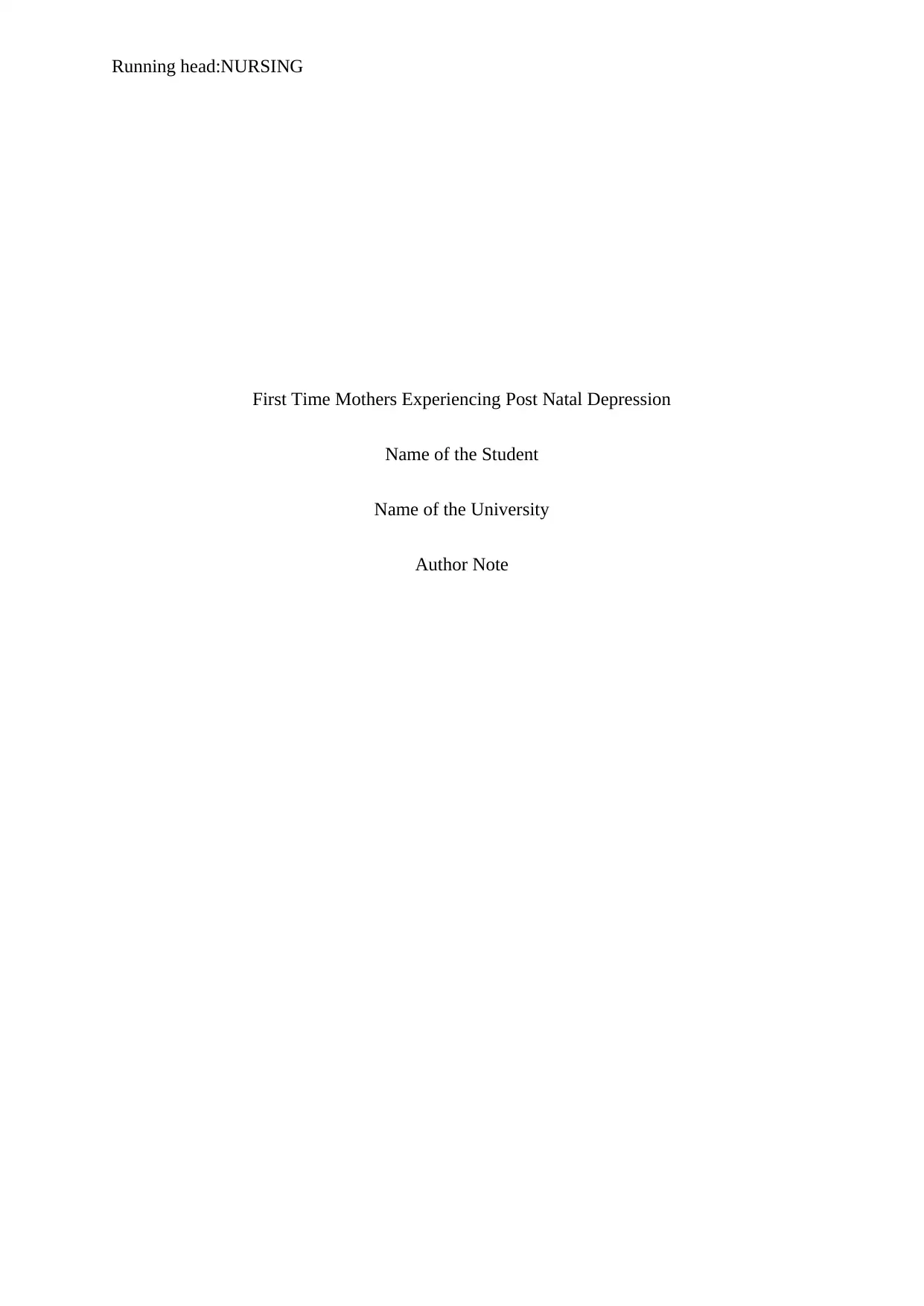
Running head:NURSING
First Time Mothers Experiencing Post Natal Depression
Name of the Student
Name of the University
Author Note
First Time Mothers Experiencing Post Natal Depression
Name of the Student
Name of the University
Author Note
Secure Best Marks with AI Grader
Need help grading? Try our AI Grader for instant feedback on your assignments.
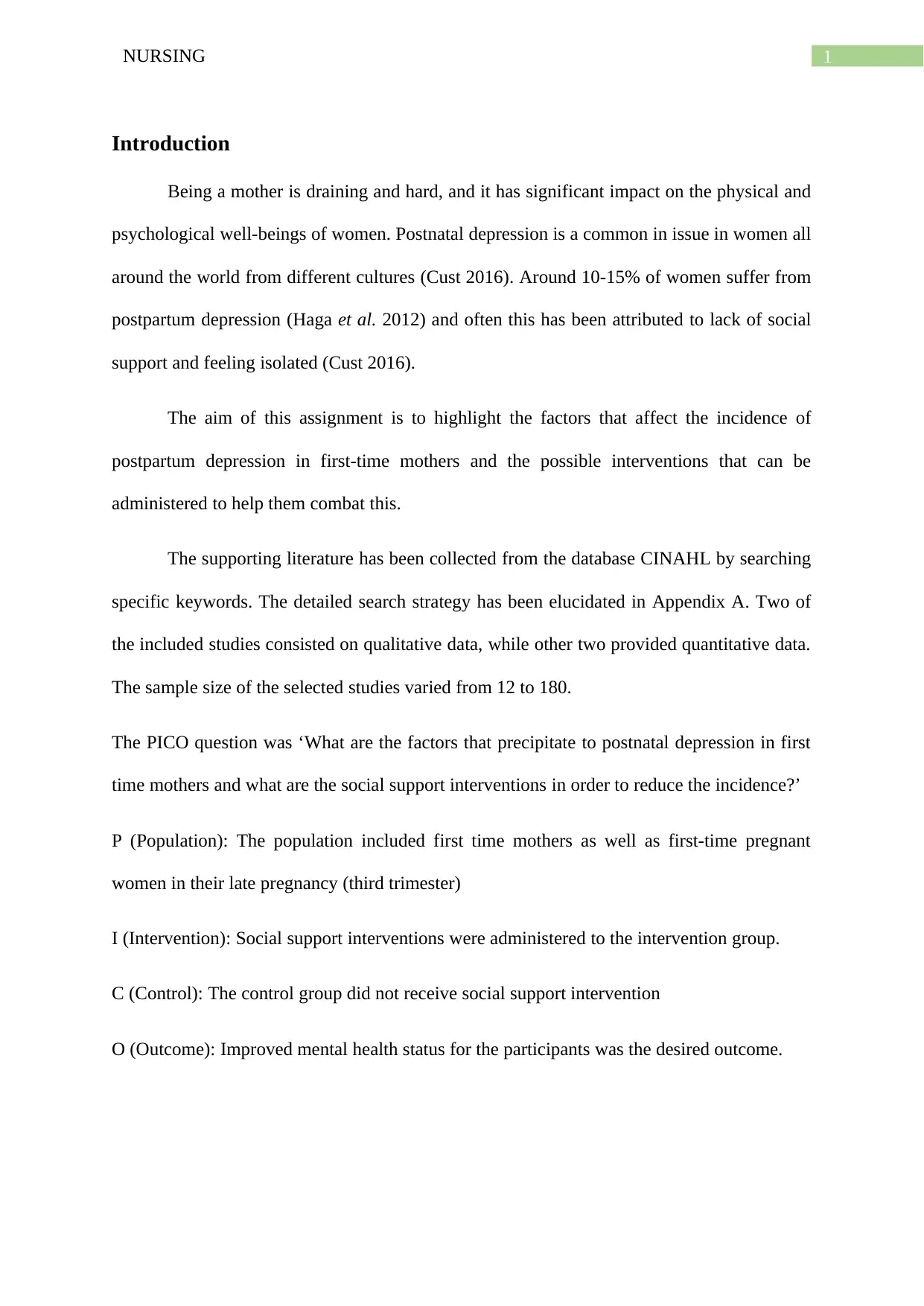
1NURSING
Introduction
Being a mother is draining and hard, and it has significant impact on the physical and
psychological well-beings of women. Postnatal depression is a common in issue in women all
around the world from different cultures (Cust 2016). Around 10-15% of women suffer from
postpartum depression (Haga et al. 2012) and often this has been attributed to lack of social
support and feeling isolated (Cust 2016).
The aim of this assignment is to highlight the factors that affect the incidence of
postpartum depression in first-time mothers and the possible interventions that can be
administered to help them combat this.
The supporting literature has been collected from the database CINAHL by searching
specific keywords. The detailed search strategy has been elucidated in Appendix A. Two of
the included studies consisted on qualitative data, while other two provided quantitative data.
The sample size of the selected studies varied from 12 to 180.
The PICO question was ‘What are the factors that precipitate to postnatal depression in first
time mothers and what are the social support interventions in order to reduce the incidence?’
P (Population): The population included first time mothers as well as first-time pregnant
women in their late pregnancy (third trimester)
I (Intervention): Social support interventions were administered to the intervention group.
C (Control): The control group did not receive social support intervention
O (Outcome): Improved mental health status for the participants was the desired outcome.
Introduction
Being a mother is draining and hard, and it has significant impact on the physical and
psychological well-beings of women. Postnatal depression is a common in issue in women all
around the world from different cultures (Cust 2016). Around 10-15% of women suffer from
postpartum depression (Haga et al. 2012) and often this has been attributed to lack of social
support and feeling isolated (Cust 2016).
The aim of this assignment is to highlight the factors that affect the incidence of
postpartum depression in first-time mothers and the possible interventions that can be
administered to help them combat this.
The supporting literature has been collected from the database CINAHL by searching
specific keywords. The detailed search strategy has been elucidated in Appendix A. Two of
the included studies consisted on qualitative data, while other two provided quantitative data.
The sample size of the selected studies varied from 12 to 180.
The PICO question was ‘What are the factors that precipitate to postnatal depression in first
time mothers and what are the social support interventions in order to reduce the incidence?’
P (Population): The population included first time mothers as well as first-time pregnant
women in their late pregnancy (third trimester)
I (Intervention): Social support interventions were administered to the intervention group.
C (Control): The control group did not receive social support intervention
O (Outcome): Improved mental health status for the participants was the desired outcome.
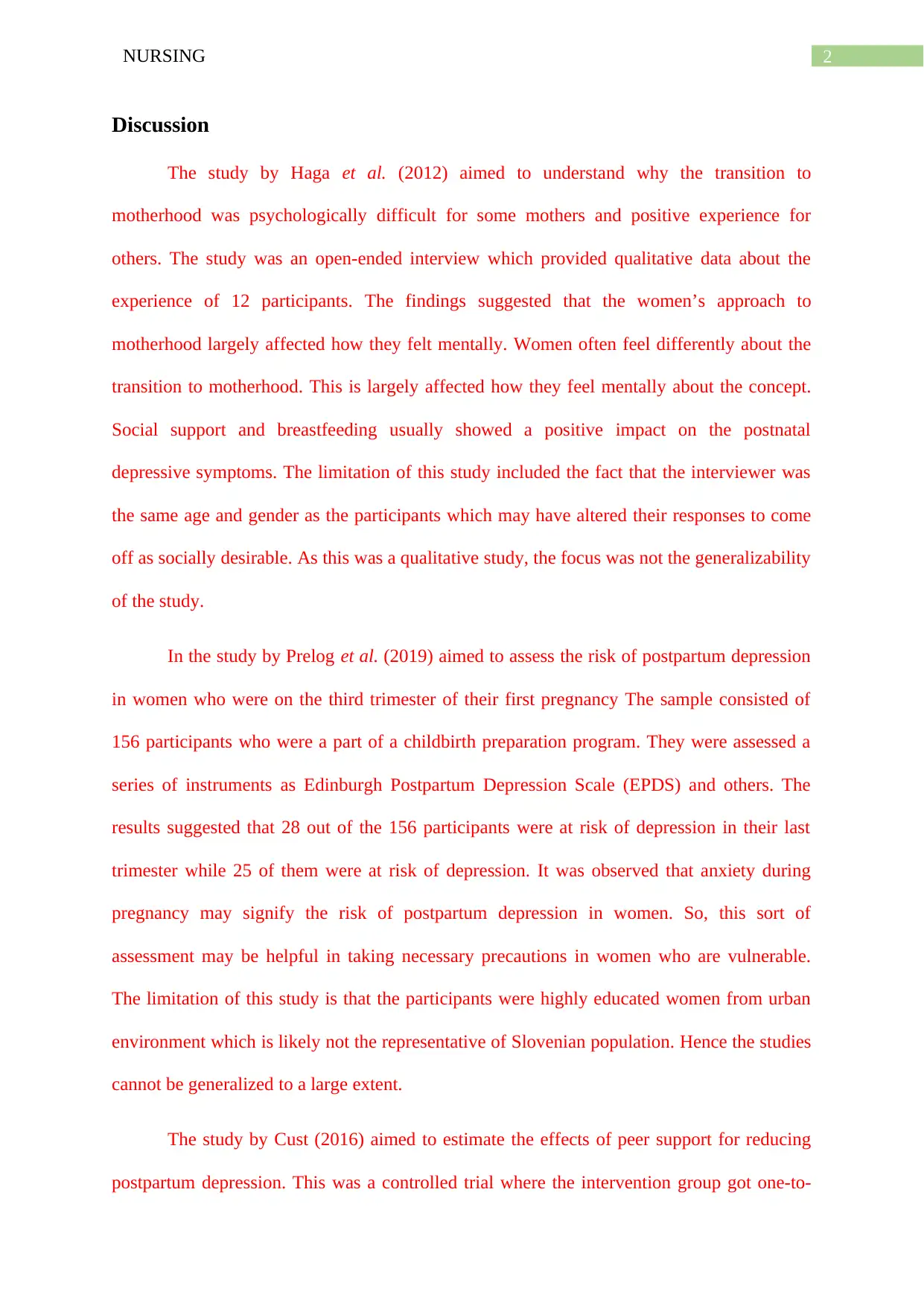
2NURSING
Discussion
The study by Haga et al. (2012) aimed to understand why the transition to
motherhood was psychologically difficult for some mothers and positive experience for
others. The study was an open-ended interview which provided qualitative data about the
experience of 12 participants. The findings suggested that the women’s approach to
motherhood largely affected how they felt mentally. Women often feel differently about the
transition to motherhood. This is largely affected how they feel mentally about the concept.
Social support and breastfeeding usually showed a positive impact on the postnatal
depressive symptoms. The limitation of this study included the fact that the interviewer was
the same age and gender as the participants which may have altered their responses to come
off as socially desirable. As this was a qualitative study, the focus was not the generalizability
of the study.
In the study by Prelog et al. (2019) aimed to assess the risk of postpartum depression
in women who were on the third trimester of their first pregnancy The sample consisted of
156 participants who were a part of a childbirth preparation program. They were assessed a
series of instruments as Edinburgh Postpartum Depression Scale (EPDS) and others. The
results suggested that 28 out of the 156 participants were at risk of depression in their last
trimester while 25 of them were at risk of depression. It was observed that anxiety during
pregnancy may signify the risk of postpartum depression in women. So, this sort of
assessment may be helpful in taking necessary precautions in women who are vulnerable.
The limitation of this study is that the participants were highly educated women from urban
environment which is likely not the representative of Slovenian population. Hence the studies
cannot be generalized to a large extent.
The study by Cust (2016) aimed to estimate the effects of peer support for reducing
postpartum depression. This was a controlled trial where the intervention group got one-to-
Discussion
The study by Haga et al. (2012) aimed to understand why the transition to
motherhood was psychologically difficult for some mothers and positive experience for
others. The study was an open-ended interview which provided qualitative data about the
experience of 12 participants. The findings suggested that the women’s approach to
motherhood largely affected how they felt mentally. Women often feel differently about the
transition to motherhood. This is largely affected how they feel mentally about the concept.
Social support and breastfeeding usually showed a positive impact on the postnatal
depressive symptoms. The limitation of this study included the fact that the interviewer was
the same age and gender as the participants which may have altered their responses to come
off as socially desirable. As this was a qualitative study, the focus was not the generalizability
of the study.
In the study by Prelog et al. (2019) aimed to assess the risk of postpartum depression
in women who were on the third trimester of their first pregnancy The sample consisted of
156 participants who were a part of a childbirth preparation program. They were assessed a
series of instruments as Edinburgh Postpartum Depression Scale (EPDS) and others. The
results suggested that 28 out of the 156 participants were at risk of depression in their last
trimester while 25 of them were at risk of depression. It was observed that anxiety during
pregnancy may signify the risk of postpartum depression in women. So, this sort of
assessment may be helpful in taking necessary precautions in women who are vulnerable.
The limitation of this study is that the participants were highly educated women from urban
environment which is likely not the representative of Slovenian population. Hence the studies
cannot be generalized to a large extent.
The study by Cust (2016) aimed to estimate the effects of peer support for reducing
postpartum depression. This was a controlled trial where the intervention group got one-to-
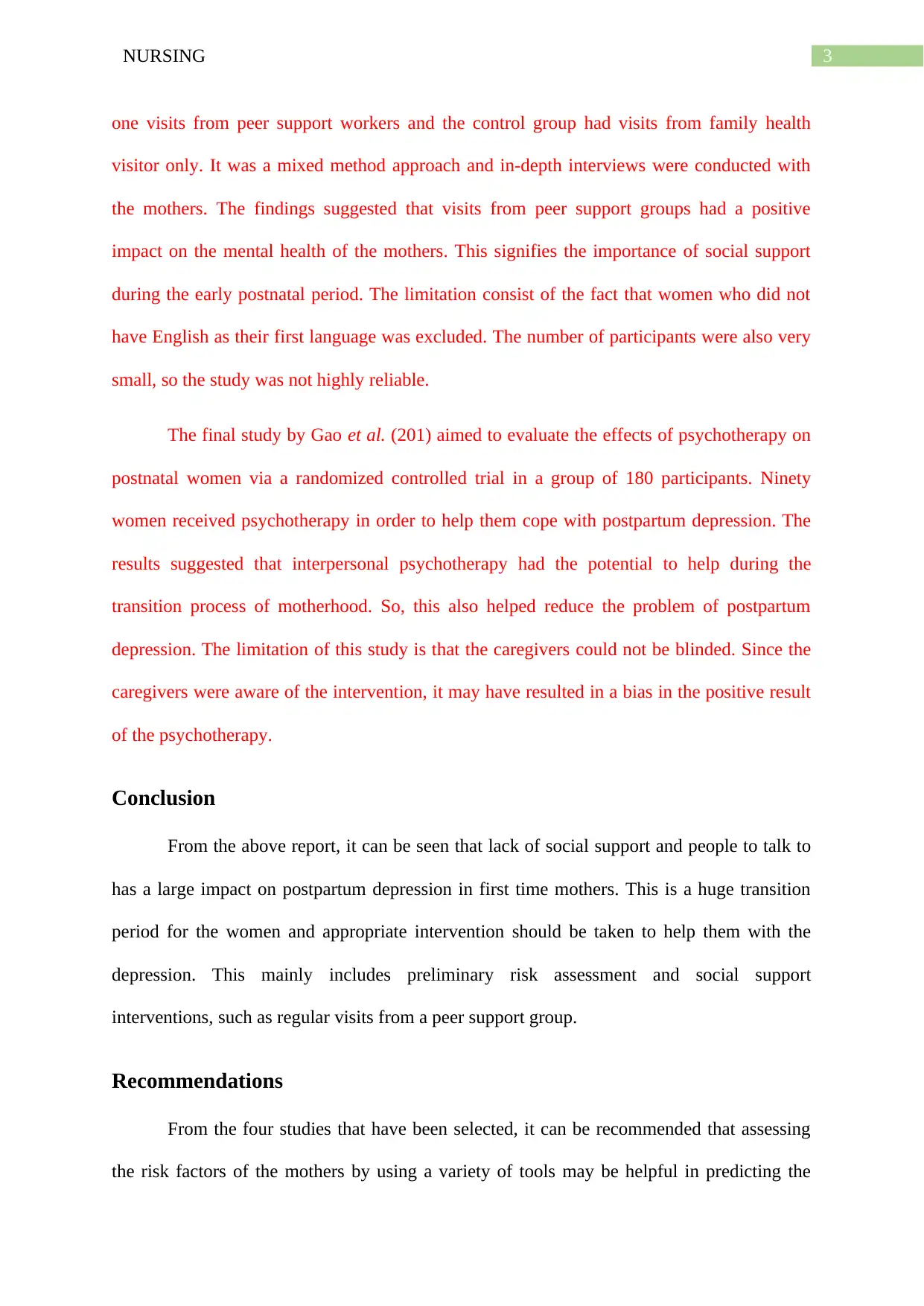
3NURSING
one visits from peer support workers and the control group had visits from family health
visitor only. It was a mixed method approach and in-depth interviews were conducted with
the mothers. The findings suggested that visits from peer support groups had a positive
impact on the mental health of the mothers. This signifies the importance of social support
during the early postnatal period. The limitation consist of the fact that women who did not
have English as their first language was excluded. The number of participants were also very
small, so the study was not highly reliable.
The final study by Gao et al. (201) aimed to evaluate the effects of psychotherapy on
postnatal women via a randomized controlled trial in a group of 180 participants. Ninety
women received psychotherapy in order to help them cope with postpartum depression. The
results suggested that interpersonal psychotherapy had the potential to help during the
transition process of motherhood. So, this also helped reduce the problem of postpartum
depression. The limitation of this study is that the caregivers could not be blinded. Since the
caregivers were aware of the intervention, it may have resulted in a bias in the positive result
of the psychotherapy.
Conclusion
From the above report, it can be seen that lack of social support and people to talk to
has a large impact on postpartum depression in first time mothers. This is a huge transition
period for the women and appropriate intervention should be taken to help them with the
depression. This mainly includes preliminary risk assessment and social support
interventions, such as regular visits from a peer support group.
Recommendations
From the four studies that have been selected, it can be recommended that assessing
the risk factors of the mothers by using a variety of tools may be helpful in predicting the
one visits from peer support workers and the control group had visits from family health
visitor only. It was a mixed method approach and in-depth interviews were conducted with
the mothers. The findings suggested that visits from peer support groups had a positive
impact on the mental health of the mothers. This signifies the importance of social support
during the early postnatal period. The limitation consist of the fact that women who did not
have English as their first language was excluded. The number of participants were also very
small, so the study was not highly reliable.
The final study by Gao et al. (201) aimed to evaluate the effects of psychotherapy on
postnatal women via a randomized controlled trial in a group of 180 participants. Ninety
women received psychotherapy in order to help them cope with postpartum depression. The
results suggested that interpersonal psychotherapy had the potential to help during the
transition process of motherhood. So, this also helped reduce the problem of postpartum
depression. The limitation of this study is that the caregivers could not be blinded. Since the
caregivers were aware of the intervention, it may have resulted in a bias in the positive result
of the psychotherapy.
Conclusion
From the above report, it can be seen that lack of social support and people to talk to
has a large impact on postpartum depression in first time mothers. This is a huge transition
period for the women and appropriate intervention should be taken to help them with the
depression. This mainly includes preliminary risk assessment and social support
interventions, such as regular visits from a peer support group.
Recommendations
From the four studies that have been selected, it can be recommended that assessing
the risk factors of the mothers by using a variety of tools may be helpful in predicting the
Secure Best Marks with AI Grader
Need help grading? Try our AI Grader for instant feedback on your assignments.
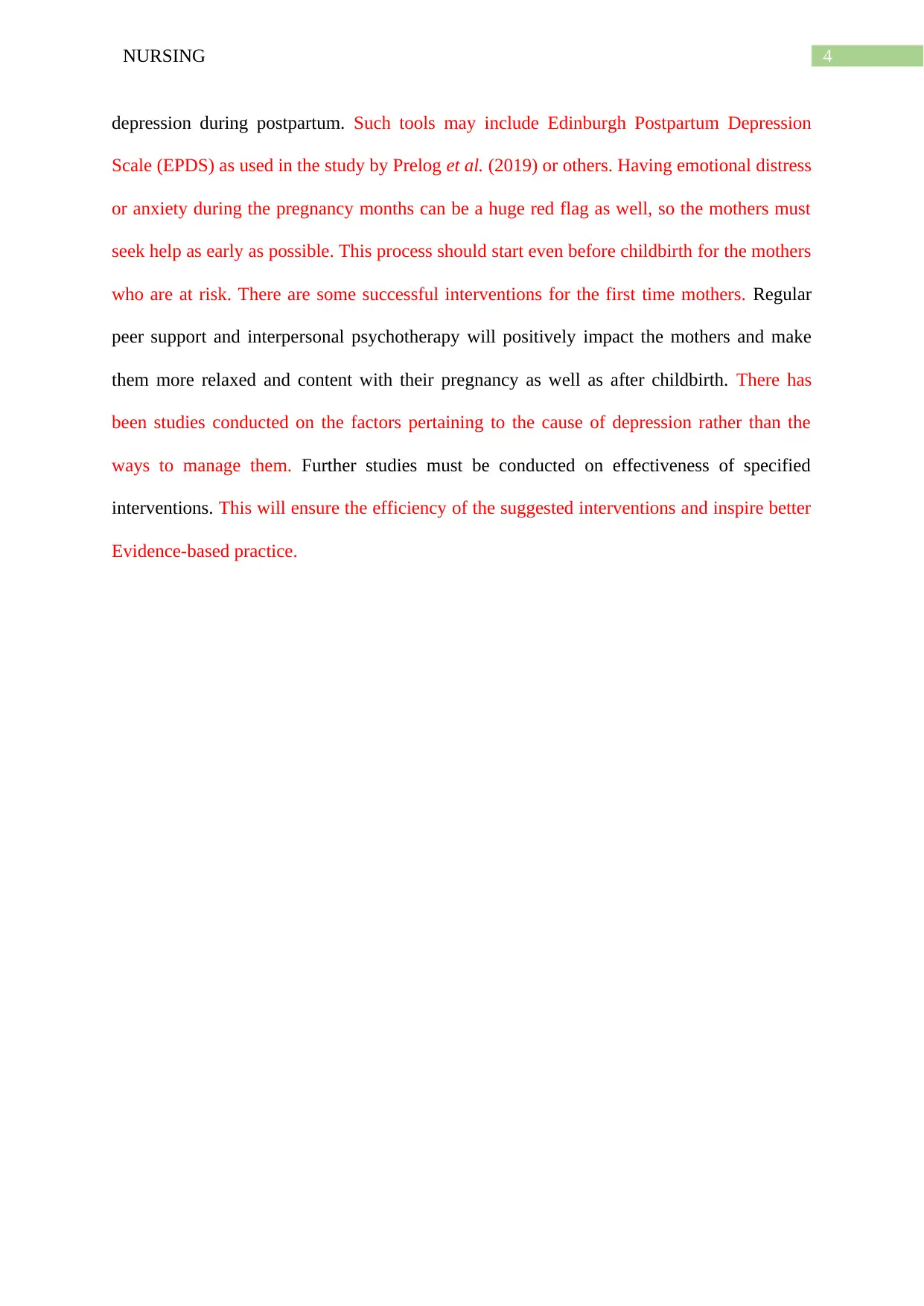
4NURSING
depression during postpartum. Such tools may include Edinburgh Postpartum Depression
Scale (EPDS) as used in the study by Prelog et al. (2019) or others. Having emotional distress
or anxiety during the pregnancy months can be a huge red flag as well, so the mothers must
seek help as early as possible. This process should start even before childbirth for the mothers
who are at risk. There are some successful interventions for the first time mothers. Regular
peer support and interpersonal psychotherapy will positively impact the mothers and make
them more relaxed and content with their pregnancy as well as after childbirth. There has
been studies conducted on the factors pertaining to the cause of depression rather than the
ways to manage them. Further studies must be conducted on effectiveness of specified
interventions. This will ensure the efficiency of the suggested interventions and inspire better
Evidence-based practice.
depression during postpartum. Such tools may include Edinburgh Postpartum Depression
Scale (EPDS) as used in the study by Prelog et al. (2019) or others. Having emotional distress
or anxiety during the pregnancy months can be a huge red flag as well, so the mothers must
seek help as early as possible. This process should start even before childbirth for the mothers
who are at risk. There are some successful interventions for the first time mothers. Regular
peer support and interpersonal psychotherapy will positively impact the mothers and make
them more relaxed and content with their pregnancy as well as after childbirth. There has
been studies conducted on the factors pertaining to the cause of depression rather than the
ways to manage them. Further studies must be conducted on effectiveness of specified
interventions. This will ensure the efficiency of the suggested interventions and inspire better
Evidence-based practice.
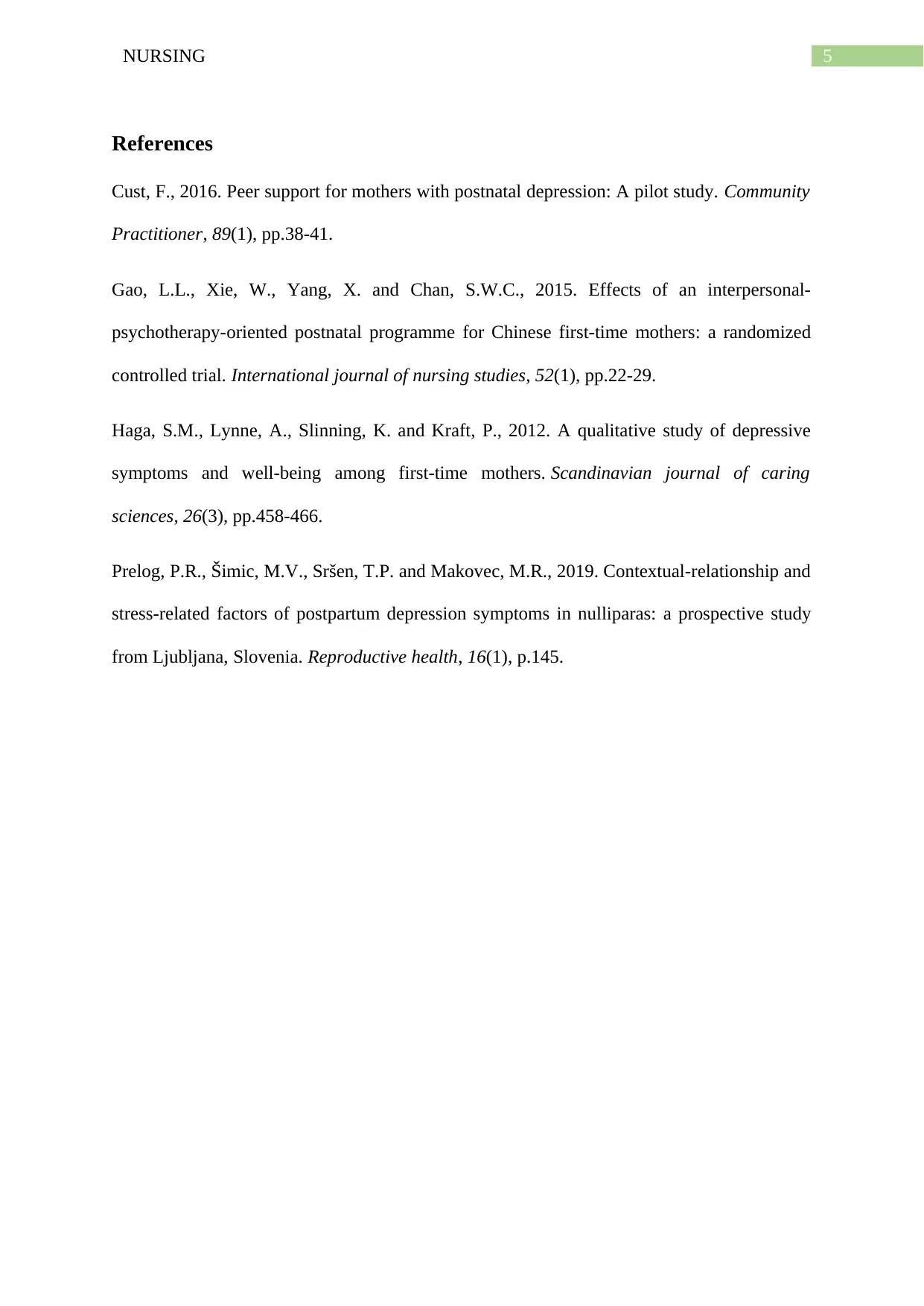
5NURSING
References
Cust, F., 2016. Peer support for mothers with postnatal depression: A pilot study. Community
Practitioner, 89(1), pp.38-41.
Gao, L.L., Xie, W., Yang, X. and Chan, S.W.C., 2015. Effects of an interpersonal-
psychotherapy-oriented postnatal programme for Chinese first-time mothers: a randomized
controlled trial. International journal of nursing studies, 52(1), pp.22-29.
Haga, S.M., Lynne, A., Slinning, K. and Kraft, P., 2012. A qualitative study of depressive
symptoms and well‐being among first‐time mothers. Scandinavian journal of caring
sciences, 26(3), pp.458-466.
Prelog, P.R., Šimic, M.V., Sršen, T.P. and Makovec, M.R., 2019. Contextual-relationship and
stress-related factors of postpartum depression symptoms in nulliparas: a prospective study
from Ljubljana, Slovenia. Reproductive health, 16(1), p.145.
References
Cust, F., 2016. Peer support for mothers with postnatal depression: A pilot study. Community
Practitioner, 89(1), pp.38-41.
Gao, L.L., Xie, W., Yang, X. and Chan, S.W.C., 2015. Effects of an interpersonal-
psychotherapy-oriented postnatal programme for Chinese first-time mothers: a randomized
controlled trial. International journal of nursing studies, 52(1), pp.22-29.
Haga, S.M., Lynne, A., Slinning, K. and Kraft, P., 2012. A qualitative study of depressive
symptoms and well‐being among first‐time mothers. Scandinavian journal of caring
sciences, 26(3), pp.458-466.
Prelog, P.R., Šimic, M.V., Sršen, T.P. and Makovec, M.R., 2019. Contextual-relationship and
stress-related factors of postpartum depression symptoms in nulliparas: a prospective study
from Ljubljana, Slovenia. Reproductive health, 16(1), p.145.

6NURSING
Appendix A: SEARCH STRATEGY FRAMEWORK
Searching Strategy:
Date January 2020
Research Topic First Time Mothers Experiencing Post Natal Depression
Search Strategy Keywords/concepts Synonyms/alternative terminology
Mothers “First-time mothers” OR “mother” OR “nulliparas”
OR “breastfeeding mothers”
Depression “maternal mental health” OR “postpartum
depressive symptoms” OR “Anxiety” OR
“postpartum depression”
Support “postnatal care” OR “support” OR “peer support”
OR “education” OR “partner attachment” OR
“empathy” OR “psychotherapy”
Limits and Type
of material
required
2010 -2020
English language
Peer-reviewed journal articles
Databases
sourced and
searched
CINAHL Complete
Appendix A: SEARCH STRATEGY FRAMEWORK
Searching Strategy:
Date January 2020
Research Topic First Time Mothers Experiencing Post Natal Depression
Search Strategy Keywords/concepts Synonyms/alternative terminology
Mothers “First-time mothers” OR “mother” OR “nulliparas”
OR “breastfeeding mothers”
Depression “maternal mental health” OR “postpartum
depressive symptoms” OR “Anxiety” OR
“postpartum depression”
Support “postnatal care” OR “support” OR “peer support”
OR “education” OR “partner attachment” OR
“empathy” OR “psychotherapy”
Limits and Type
of material
required
2010 -2020
English language
Peer-reviewed journal articles
Databases
sourced and
searched
CINAHL Complete
Paraphrase This Document
Need a fresh take? Get an instant paraphrase of this document with our AI Paraphraser
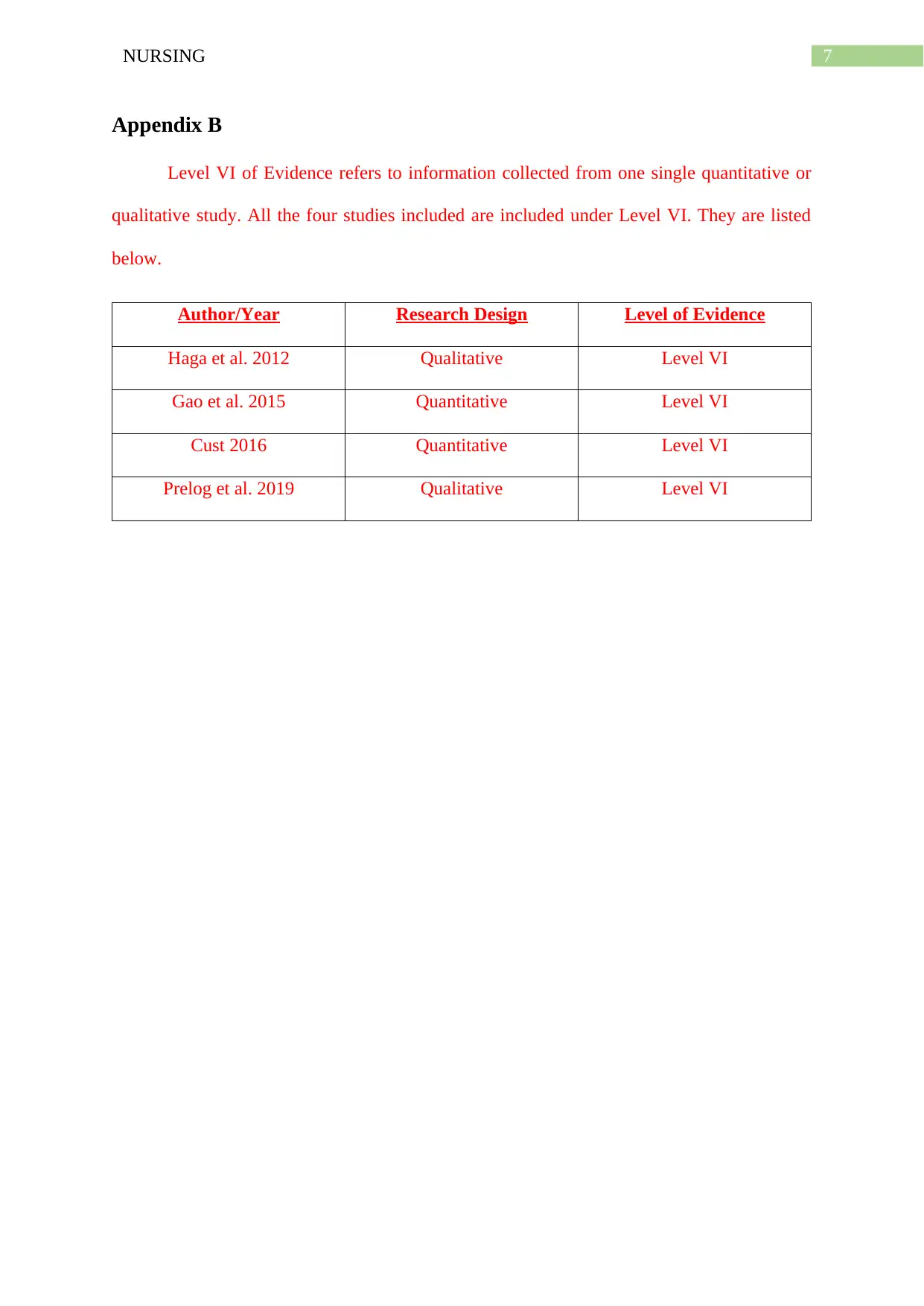
7NURSING
Appendix B
Level VI of Evidence refers to information collected from one single quantitative or
qualitative study. All the four studies included are included under Level VI. They are listed
below.
Author/Year Research Design Level of Evidence
Haga et al. 2012 Qualitative Level VI
Gao et al. 2015 Quantitative Level VI
Cust 2016 Quantitative Level VI
Prelog et al. 2019 Qualitative Level VI
Appendix B
Level VI of Evidence refers to information collected from one single quantitative or
qualitative study. All the four studies included are included under Level VI. They are listed
below.
Author/Year Research Design Level of Evidence
Haga et al. 2012 Qualitative Level VI
Gao et al. 2015 Quantitative Level VI
Cust 2016 Quantitative Level VI
Prelog et al. 2019 Qualitative Level VI
1 out of 8
Related Documents
Your All-in-One AI-Powered Toolkit for Academic Success.
+13062052269
info@desklib.com
Available 24*7 on WhatsApp / Email
![[object Object]](/_next/static/media/star-bottom.7253800d.svg)
Unlock your academic potential
© 2024 | Zucol Services PVT LTD | All rights reserved.




